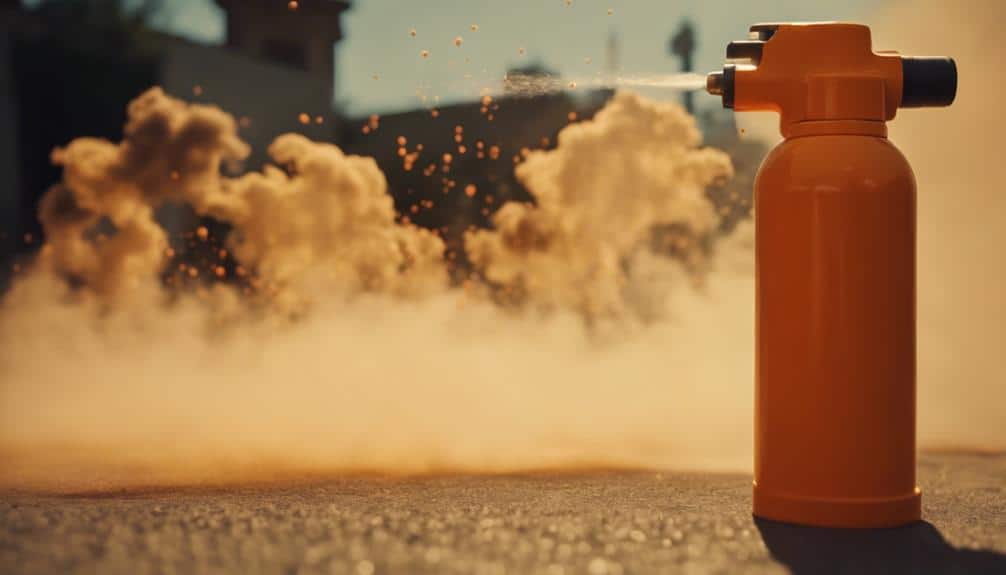Pepper spray hits almost everyone like a ton of bricks! When you get a face-full of this fiery concoction, it feels like you’ve been walloped by a swarm of stinging bees. Your
eyes burn, tears gush down like waterfalls, and you might even find yourself coughing like you’ve inhaled a room full of smoke. It’s downright miserable for pretty much anyone. However, if you’ve got
asthma or allergies, watch out—your reaction could be a lot worse. And if
symptoms linger past 30 minutes, it might be time for a
trip to the doctor. Curious about those exceptions and special cases? Stick around!
What Is Pepper Spray?
Pepper spray, often called
OC spray, is a
non-lethal self-defense tool that packs a powerful punch due to its main ingredient,
oleoresin capsicum, an extract from chili peppers. Imagine holding a little canister that can release the fiery wrath of over
2 million Scoville heat units (SHU) directly into an attacker’s face. Sounds intense, right? That’s because it is! This self-defense tool is designed for rapid response, inflicting
immediate eye pain and a burning sensation that’ll make anyone think twice before messing with you. The oleoresin capsicum is what gives
pepper spray its kick, making it considerably hotter than your average jalapeño pepper. Just a quick spritz can cause severe burning, tearing, and even
temporary blindness, which is why law enforcement and civilians alike rely on it for protection.
You’ll find pepper spray in various forms, from aerosol canisters to nifty keychains and pens, making it super portable. For example, the
Pink Mace Pepper Spray Jogger is designed specifically for active individuals, offering quick deployment capability during emergencies. But before you go strapping one to your keyring, remember that
legal restrictions vary. Some places reserve this fiery little helper for law enforcement only, while others allow civilian use. So, always check your local laws before adding pepper spray to your
self-defense arsenal.
Typical Effects on the Body
When you consider the potency of pepper spray, it’s no surprise that its effects on the body are both immediate and intense. Once you’re hit with pepper spray exposure, you’ll feel an intense burning pain almost instantly. Your eyes will sting like they’re on fire, leading to excessive tearing and even temporary blindness. As if that wasn’t enough, your respiratory system gets in on the action too, making you cough uncontrollably and irritating your throat.
| Reaction |
Symptom |
Duration (minutes) |
| Eye irritation |
Burning, tearing |
15-45 |
| Respiratory distress |
Coughing, throat pain |
15-45 |
| Skin sensitivity |
Redness, burning |
15-45 |
The typical effects of pepper spray can vary, depending on your sensitivity to it. Some people might experience more severe reactions, especially if they have pre-existing conditions like asthma. You might end up feeling like your skin is on fire, and even though the effects are usually temporary, they can be pretty overwhelming.
Most folks don’t suffer any lasting health problems from pepper spray exposure. The discomfort generally subsides after about 15 to 45 minutes. However, if you notice symptoms lingering beyond 30 minutes, it’s smart to seek medical attention.
Severe Reactions and Risks
For some individuals, the effects of
pepper spray can be more than just a temporary nuisance. If you have pre-existing
respiratory conditions like
asthma, pepper spray can be a real nightmare. Imagine struggling to catch your breath, your airways feeling tighter and tighter. That’s what can happen when someone with asthma or other serious
health vulnerabilities is exposed to it. The severe reactions are no joke, and you might find yourself gasping for air, experiencing serious
difficulty breathing. Even the
UV identifying dye added to some pepper sprays can occasionally cause skin irritation.
Now, let’s talk about
allergic reactions. Some people might not even know they’re allergic to the components in pepper spray until it’s too late. If you find yourself with a
burning sensation that just won’t quit or symptoms that seem way worse than what others are experiencing, allergies could be to blame. And if you have
heart conditions, the exposure can ramp up risks, leading to potentially dangerous complications.
If you or someone around you is still suffering from symptoms like burning or difficulty breathing beyond 30 minutes, it’s time to seek a
medical evaluation. Don’t wait around hoping it’ll just go away. Your health is too important to take chances.
Treatment After Exposure
After getting hit with
pepper spray, you need to act fast for relief—head to fresh air,
flush your eyes with water for a solid 15-20 minutes, and don’t rub them, no matter how much they burn. The effects can last up to 45 minutes, causing
significant discomfort. Forget home remedies like milk or baby shampoo; they’re not proven to help, and water is your best bet. If you’re still in pain after 30 minutes, or if you’re having trouble breathing, it’s time to get to a doctor, as you might need more serious treatment.
Immediate Relief Measures
Exposure to pepper spray can be
intensely painful but knowing
immediate relief measures can greatly ease the discomfort. The first thing you should do is
move to fresh air. This helps clear your lungs and reduce throat irritation. Next, focus on your eyes;
rinse them with clean water or a saline solution for at least 15-20 minutes. Trust us, you’re going to want to avoid using soap in your eyes—ouch! If you have a
Mace Pepper Spray Hard Case, it’s always a good idea to familiarize yourself with its features beforehand.
For your skin,
wash the affected areas with soap and water. Make sure to remove any contaminated clothing to prevent the spread of the irritant. If you’re still coughing or your throat feels like it’s on fire, a
steamy shower can offer some relief, and don’t forget to
stay hydrated.
Here’s a quick list to help you remember:
- Move to fresh air immediately.
- Rinse eyes thoroughly with water or saline.
- Wash skin with soap and water.
- Remove contaminated clothing.
- Take a steamy shower and drink water.
If your symptoms persist for more than 30 minutes or if you experience severe reactions, don’t hesitate—seek medical attention right away. Emergency responders are trained to manage these situations effectively. Your comfort and safety come first!
Home Remedies Effectiveness
While
immediate relief measures are essential in mitigating the initial discomfort of pepper spray exposure, understanding the effectiveness of
home remedies can be equally important for ongoing treatment. When pepper spray hits, you’ll want to
wash your hands immediately to prevent spreading the irritant.
Soap and water work wonders for skin irritation, providing quick and effective relief. The
safety lock on the Wildfire Pepper Spray can help prevent accidental exposure, but if it does happen, these steps are vital.
For your eyes, nothing beats a good
rinse with water or saline. Eye rinsing helps flush out the irritant, reducing that burning sensation and restoring your vision. Steamy showers can soothe
throat irritation, making it easier for you to breathe and feel comfortable again.
Although you might hear about using baby shampoo or milk, these remedies aren’t proven to work. Stick with water—it’s your best bet. If you find that symptoms persist beyond 30 minutes or if you’re experiencing severe reactions, it’s vital to
seek medical attention. Don’t play the hero; your health is important!
Professional Medical Assistance
Seeking
professional medical assistance isn’t just a smart move; it’s often necessary when dealing with
severe pepper spray exposure. Imagine your eyes burning, your skin on fire, and struggling to breathe—all at once. That’s when you need to act fast.
Immediate treatment involves moving to fresh air and flushing the affected areas with water, but sometimes, that’s not enough.
Causes pain and
respiratory difficulty are common effects, which can be particularly distressing.
When you reach out to healthcare providers, they might:
- Recommend rinsing your eyes with a saline solution or clean water for 15-20 minutes.
- Administer oxygen therapy if you’re experiencing severe respiratory distress.
- Use specific wipes and saline solutions to soothe your skin and eyes.
- Monitor you for complications, especially if you have asthma or other conditions.
- Provide further care if symptoms persist beyond 30 minutes despite home treatments.
If you’re gasping for air or your eyes feel like they’re on fire even after rinsing, don’t hesitate. Medical attention can make a huge difference. Besides, it’s better to be safe than sorry. Plus, those
emergency responders? They’re trained to handle this stuff like pros. So, don’t tough it out alone let the experts help you breathe easy again.
Legal and Ethical Issues
When you think about
pepper spray, it’s essential to know that its use is
tightly controlled by laws, especially for civilians. The
ethical concerns are real too—imagine being in a crowd and suddenly struggling to breathe because of a spray meant to control people but harming those with asthma. Also, the rules say cops need proper training to use it right, so they don’t mess up and hurt more than they help. It’s worth noting that certain
safety features like the flip-top safety cap and finger-grip dispenser are designed to prevent misuse and guarantee accurate aim.
Regulation and Restrictions
Pepper spray regulations vary widely across different jurisdictions, reflecting a complex landscape of legal and ethical considerations. You might find that in some places, civilians can carry pepper spray for personal protection but only in specific sizes and concentrations. Meanwhile, law enforcement agencies often have broader access and must undergo training to use it safely. This disparity in regulation can lead to confusion and raises ethical concerns, especially when pepper spray is used for crowd control. For instance,
Mace Pepper Spray comes in various forms, including pocket models and pepper guns, each with different usage guidelines.
Here are some key points to take into account:
- Varying Laws: Some areas allow civilians to carry pepper spray, while others heavily restrict or even ban it.
- Training Requirements: Law enforcement personnel usually require training to use pepper spray properly, ensuring accountability.
- Ethical Concerns: The use of pepper spray in crowd control can be controversial, particularly when it affects vulnerable populations.
- Chemical Weapons Convention: This international treaty prohibits the use of pepper spray in warfare, underlining its non-lethal classification.
- Personal Protection: Many people carry pepper spray for self-defense, seeing it as an essential tool for personal safety.
Navigating these regulations can be tricky but understanding them is imperative for making informed decisions about its use.
Ethical Use Concerns
Ethical Use Concerns (Legal and Ethical Issues)
Ethical dilemmas surrounding the use of pepper spray by law enforcement are multifaceted, often spotlighting concerns about
excessive force and
human rights violations. When you think about pepper spray, it’s hard not to picture
chaotic crowd control scenes. Law enforcement often resorts to this tool, but it’s imperative to weigh ethical considerations. Misusing pepper spray can lead to serious allegations of excessive force and even human rights abuses during protests. It’s also worth noting that the
effects can last up to 45 minutes, which could result in
prolonged suffering for those affected.
You might wonder if
proper training could make a difference. Absolutely! Ensuring officers know when and how to use pepper spray can minimize harm. But here’s the kicker: those with
pre-existing conditions, like asthma or heart problems, are at greater risk. Imagine being in a crowd and suddenly struggling to breathe because of pepper spray—it’s a terrifying thought.
Marginalized groups often bear the brunt of these actions, raising
social justice concerns. It’s not just about the spray; it’s about who gets sprayed.
Systemic biases can lead to its disproportionate use against vulnerable communities. So, when considering pepper spray’s role in law enforcement, you can’t ignore the ethical implications. Balancing
safety and justice is never simple, but it’s essential.
Impact on Vulnerable Populations
While the ethical concerns surrounding the use of pepper spray by law enforcement are significant, the impact on vulnerable populations adds another layer of complexity. Imagine being sprayed with pepper spray if you have asthma or other pre-existing respiratory conditions. It’s not just uncomfortable; it can turn into a medical emergency really quick. Vulnerable populations face a higher risk, and it’s not just physical—there are heavy ethical implications too. For instance, using pepper spray during
sports and outdoor activities like running or hiking can be particularly dangerous for individuals with health conditions.
Let’s break it down:
- Pre-existing respiratory conditions: People with asthma or similar issues can experience severe, even fatal reactions.
- Crowd control: Using pepper spray in large gatherings can disproportionately affect marginalized communities.
- Ethical implications: Spraying individuals with mental health issues or disabilities raises serious questions.
- Medical emergencies: The risk of serious health problems skyrockets for those already vulnerable.
- Human rights: Unequal enforcement and lack of knowledge about legal regulations can lead to human rights violations.
These facts highlight how the use of pepper spray isn’t just a simple law enforcement tool. It’s a complex issue with serious consequences, especially for those who are already at a disadvantage. The debate about its use in crowd control and its ethical implications is far from over.
Case Studies and Real Incidents
Real-life experiences provide invaluable insights into the effects of
pepper spray. Imagine an 8-year-old boy who got a tiny bit of pepper spray in his eyes. Thanks to his glasses, he only had
minor skin irritation that went away after a good wash. Not so bad, right? But what about the woman who tested pepper spray indoors? She ended up coughing and with a
sore throat, needing fresh air and water to feel better. Both of these incidents show that while you might face
temporary discomfort, it’s usually manageable.
Law enforcement officers use pepper spray, knowing it causes some pain but is generally safe. Yet, if you have asthma, it’s a different story. You could be
extra sensitive and might need
medical attention right away. That’s why
public awareness is essential. More people need to know how to handle pepper spray safely and what to do if they get exposed.
Medical professionals often get calls from people who’ve accidentally sprayed themselves. These stories aren’t just funny mishaps; they highlight the need for
better education on pepper spray’s effects. So, next time you think about using it, remember these real-life lessons.
Frequently Asked Questions
Are There People That Are Not Affected by Pepper Spray?
You might find people who aren’t affected by pepper spray. Its effectiveness can vary due to personal tolerance, chemical composition, environmental factors, medical conditions, training techniques, or legal implications. Everyone’s response to it is unique.
Who Is Immune to Pepper Spray?
You might think some people are immune to pepper spray, but that’s not true. Individual reactions vary due to pepper spray sensitivity, health conditions, and training techniques. Environmental factors and legal implications also influence its effectiveness.
What Percentage of People Carry Pepper Spray?
You might be surprised by pepper spray statistics: around 5% of U.S. adults carry it regularly. Usage effectiveness and public perception vary, but it’s popular in high-crime areas due to personal safety awareness and legal regulations.
What Is the Main Risk of Using Pepper Spray on People?
Pepper spray’s primary peril includes severe health impacts on asthmatics and those with heart issues, leading to potential medical treatments. Legal implications and ethical considerations arise from misuse, affecting its effectiveness duration as a self-defense tool.








3 Responses